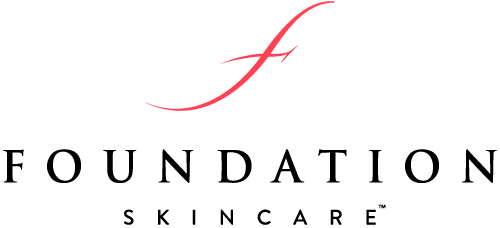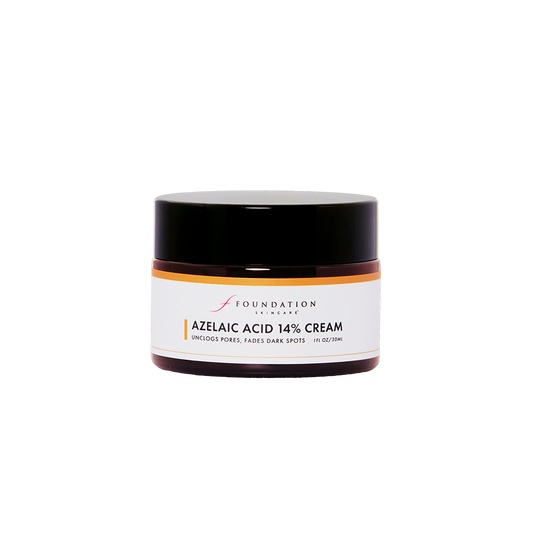If you struggle with acne, chances are you’ve scoured the internet trying to find the latest tips or tricks to get clear skin. Sometimes, the advice can be useless, like slathering toothpaste across your blemishes or spraying saltwater on your face. And with so many different acne products on the market, it can be difficult to figure out what’s legit and what’s not.
With the help of Dr. Anthony Nuara, MD PhD FAAD, we’re going to dispel some myths about acne treatments and causes and share which products actually help reduce and prevent acne breakouts.
What Causes Acne?
Acne is multifactorial, which means it isn’t caused by just one thing. What we know for sure is that an acne blemish occurs when a pore becomes clogged with sebum (oil) and dead skin cells. This may appear as a blackhead or whitehead. When the oil or dead skin cells become inflamed or infected with bacteria like cutibacterium acnes, a raised pimple may appear.
But what causes this excess oil, clogging, and inflammatory response in people who struggle with acne regularly? Here’s what the science says:
- Genetics: In a 2021 systematic review and meta-analysis,1 researchers found 60 genes associated with acne predisposition. So, if you have a family history of acne, you may likely struggle with acne too.
- Hormones: There’s a reason why acne is typically associated with teenagers: hormones. Hormonal fluctuations during puberty can result in increased sebum production and acne lesions, but fluctuations can also occur throughout adulthood. Women may suffer from acne at different points of their menstrual cycle or during menopause. Men can struggle with acne if they have high levels of testosterone or are on hormonal therapy.
- Medications: Acne can also be a side effect of different medications, such as corticosteroids, lithium, vitamin B12, thyroid hormones, and antibiotics.2
- Lifestyle: This is a tricky one. While stress, poor diet, and inadequate sleep do not necessarily cause acne, they can trigger breakouts for those who are genetically predisposed.
Now that you’ve got a basic idea of what might be causing your acne, it’s time to correct some misconceptions. Here are four of the top acne myths debunked.
Azelaic Acid 14% Cream
• Brightens skin, fades brown spots
• Unclogs pores, improves texture
Myth #1: Drinking Water Will Clear Your Breakouts
Water is undoubtedly good for you and your skin, but it has no real therapeutic role other than helping you wash your face. While studies show that sufficient water intake positively impacts skin by increasing elasticity (which can help slow signs of aging), there is not enough evidence to determine how it impacts acne blemishes.3
Myth #2: Only Teenagers Get Acne
I wish this was true. Adults often get acne, particularly middle-aged women and those approaching menopause due to the drastic hormonal fluctuations that occur during this time. Adult men and women who choose to undergo hormone replacement therapy or have high testosterone may also suffer breakouts.
Myth #3: Eating Junk Food is the Cause of Your Acne
There is a little truth to this. A diet high in carbohydrates4 and refined sugar have been shown to exacerbate acne.5 These types of foods increase your serum triglycerides and increase sebum production, which can lead to clogged pores. Whey protein is also known to worsen acne in young adults.6
Myth #4: Having Acne Means Your Face Should Be Cleaned More Often
While hygiene is important to maintaining healthy skin, you can only scrub away so much. In fact, washing too often or scrubbing too vigorously may irritate skin and make acne even worse. Gentle cleansers are preferred, but if you opt for one containing alpha and beta hydroxy acids to unclog pores, be sure to use them sparingly as they can irritate your skin.
Best Products to Help with Acne Breakouts
Two powerful ingredients you should add to your skincare regimen are niacinamide and azelaic acid. Gentle enough to use together, these two multitasking ingredients can help clear up breakouts and prevent them altogether. Here’s how they compare:
- Foundation Skincare’s Niacinamide Lotion 10%: Formulated with a hydrating hyaluronic acid base, this product helps to curb sebum production to control and prevent acne while soothing the inflammation and irritation associated with breakouts. Niacinamide can also build immunity in the skin against infections, fade acne scars, and assist in DNA repair.
- Foundation Skincare’s Azelaic Acid 14% Cream: This daily essential cream contains a potent medical-grade concentration of azelaic acid, which is a beneficial yeast with antibacterial, antioxidant, and anti-inflammatory properties. It clears acne-causing bacteria from the skin, eases inflammation, and fades hyperpigmentation caused by acne scarring. Azelaic acid is also suitable for hormonal acne because it blocks increased oil production caused by elevated testosterone.
Women with hormonal breakouts or anyone with acne that is causing pitted scarring should consider consulting a board-certified dermatologist for more advice and a suitable treatment plan.
Navigating the landscape of acne treatments can be overwhelming, but it doesn’t have to be. The next time someone shares a weird new trick with you, make sure to ask for the evidence supporting their claims. There are countless myths and misconceptions surrounding what causes acne and how to treat it, but once you start using the right products, the path to the clear skin, and your skin itself, becomes clear.
Related Articles: Adult Acne 101, Does Face Lotion Hurt or Help Acne?, Top 5 Skincare Products for Acne & Scarring
References:
-
https://bmcmedgenomics.biomedcentral.com/articles/10.1186/s12920-021-00953-8
-
https://www.ncbi.nlm.nih.gov/pmc/articles/PMC3900370/
-
https://www.ncbi.nlm.nih.gov/pmc/articles/PMC4529263/
-
https://pubmed.ncbi.nlm.nih.gov/24719062/
-
https://pubmed.ncbi.nlm.nih.gov/32520303/
-
https://www.ncbi.nlm.nih.gov/pmc/articles/PMC3900340/






